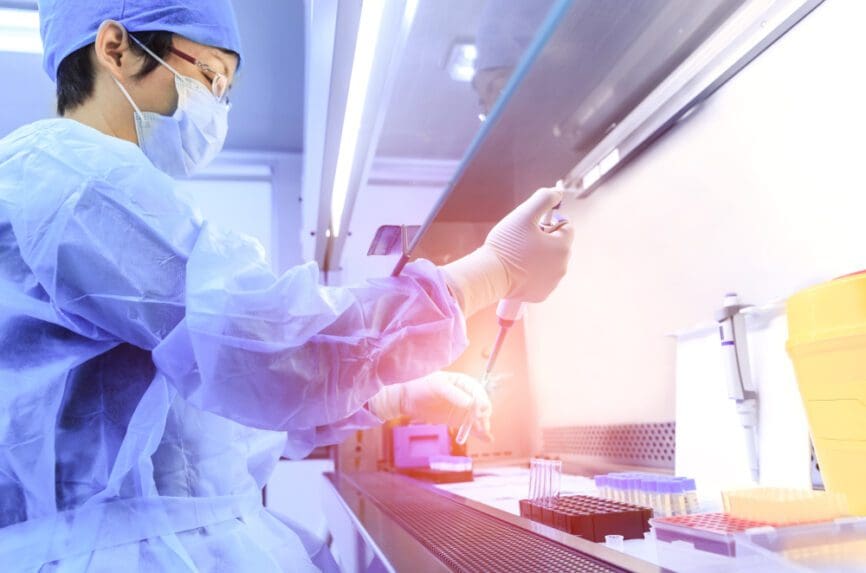Bioethics Forum Essay
From Gene-Edited Embryos to Covid: China Faces Regulatory and Ethical Challenges
In early April, He Jiankui, the Chinese scientist who used gene-editing technology on human embryos born in 2018, was released from his three-year prison sentence, imposed after a Shenzhen District Court convicted him of “illegal medical practice.” He and two accomplices were banned from conducting any work related to assisted reproductive technology, applying for administrative permits for research on human genetic resources, and from applying for research funds.
The He Jiankui affair and, little more than a year later, the Covid pandemic have focused attention in China on ethical governance of research and medical practice. Over the last two years, China has updated some regulations on human genetic engineering and assisted reproduction and established a national committee to guide and supervise bioethics nationwide. But there are legal gaps in some of the regulations and tension between competing values: the desire to encourage new research and to potentially inhibit it by imposing stricter ethics regulations.
An example of this tension came out in public expression over He Jiankui. Ever since his arrest there have been occasional comments on Chinese social media and news platforms that sympathize with him. After learning about his humble family background and how he strived to make scientific achievements and gain recognition, some media commenters have found him relatable and expressed hope that he would apply his research skills in the future. It is doubtful that these people fully understand the details of his experiment, including falsifying institutional review board approval and safety data and using undue inducement to recruit subjects, since the court hearing was not publicly disclosed and many news reporters have limited ability to cover the full details and ethical concerns of the case.
In early 2020, China updated a series of regulations to prevent future cases like the one involving He Jiankui. The most legally authoritative regulations are amendments to the Civil Code and the Criminal Code. China’s National People’s Congress (NPC) approved Article 1009, which required all human gene- and embryo-related research to comply with ethics and relevant administrative regulations, whose insufficient legal force many scholars were previously concerned about. The NPC also approved an amendment to the Criminal Code’s Article 336, which criminalizes serious illegal medical practices by unqualified personnel and specifies that implantation of gene-edited or cloned embryos into the human body will receive three-to-seven years of imprisonment, depending on what judges consider to be the severity of the offense. This amendment clarifies that gene-editing human embryos is a severe offense, but only under the scope of illegal medical practice.
An open question is how to legally frame the He Jiankui affair if He and his team had been medical providers. In China there is no law, but only administrative regulations, that specifically address the research and clinical application of human genetic engineering and assistive reproductive technologies. If He and his team had been medical providers, it is unclear whether they would have been convicted of medical malpractice. That’s because, under the Criminal Code, for a medical provider to be convicted of malpractice, it is necessary to show that the provider’s actions resulted in a patient’s death or grave harm. Any harms from genetically editing the human embryos may not be apparent for many years. .
The legal gap in regulating human gene-editing and ART has another aspect: administrative regulations are not legally binding and lack the force of punishment. In response to the He affair, the National Health Committee (NHC) drafted the Regulations on the Management of the Clinical Application of Innovative Biomedical Technologies, which requires that any high-risk clinical research, including gene-editing and ART, gets NHC approval. Furthermore, only the top-ranked hospitals can conduct such high-risk clinical research, and only experienced medical providers are eligible for principal investigators. Punishment for violations is administrative only, including fines and cancellations of license. Some scholars have thus urged adopting some guidelines in law.
In 2020, a National Ethics Committee for Science and Technology in China was established to guide and supervise bioethics nationwide. In March 2022, the committee drafted and published Opinions on Strengthening the Ethical Governance of Science and Technology, which established guiding values, informed by past experiences in the international community and built on consensus, to demonstrate China’s attitude towards and commitment to ethical science. The document also sets goals to develop and refine China’s ethical governance, from supervision of ethics committees to increasing bioethics education for students in relevant areas. The committee also plans to develop guiding principles to supervise Covid-related clinical research to protect subjects’ rights.
So far, China has demonstrated its willingness to advance its ethical governance of innovative technologies, but it faces a dilemma whether to encourage technology research or to implement stricter regulations. This dilemma is familiar in other national settings as well, but in China it takes on a special character. A law professor in China observed that the idea of reducing obstacles for researchers by not setting up punishment in department guidelines is common in research institutions.
Setting aside the question to what extent China should establish legal deterrence against unethical science, however, law alone can never achieve true ethical governance. Ethics literacy among journalists and their readers is limited, and many ethics committees are mere formalities. Given that currently few Chinese higher education institutions have bioethics education, China still has a long way to go to establish a culture of ethics in science.
Yuting Zhu is a junior at the University of Pennsylvania. Jonathan D. Moreno, PhD, (@pennprof) is the David and Lyn Silfen University Professor of Ethics at the University of Pennsylvania and a Hastings Center fellow.












